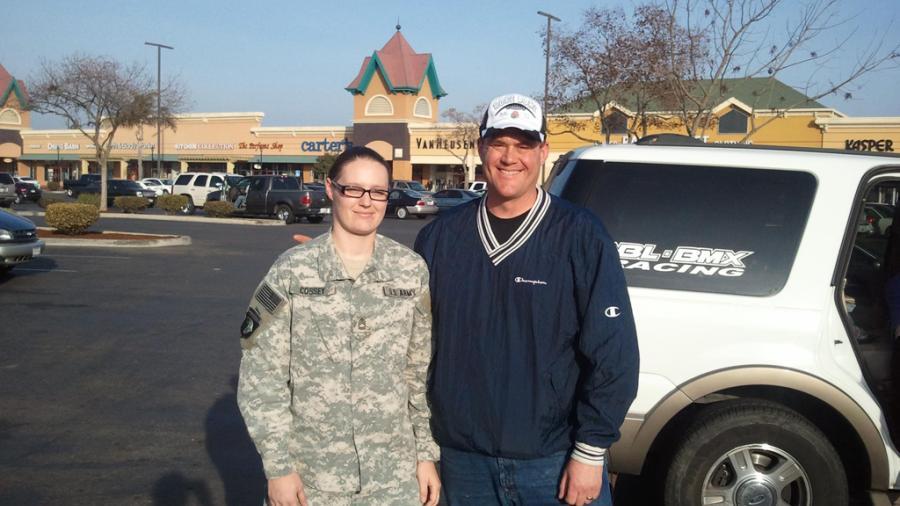Westmont Magazine Staying the Course

by Brian Landis ’97
As a young adult I learned four things about the life God gives us. No matter how difficult your situation is, you were meant to be there; your true nature comes out in the most trying and stressful situations; you help whom you can, when you can and where you can; and you take care of your own. I depended on these lessons to get me through every day while teaching at Rafer Johnson, a continuation school in Bakersfield, Calif.
I quickly learned how ideas both twist and heal the human mind and how one fateful decision can breach the thin line between chaos and redeeming value. A normal teacher would likely quit such a stressful job. In the eight years I taught at Rafer, I was punched, strangled, kicked, hit with numerous objects, spat on and called names. It’s not what I envisioned when I studied social sciences at Westmont. But God has his own ideas, and I was needed more than I knew.
Students were sent to our campus for gang activity, drug use, fighting and suspensions. Every year, we lost a handful to their troubles. Most lived in horrible situations at home. All they knew about life was to bring themselves—and those around them—down.
With great frustration, I once tried to teach a young man about the value of human life, but he later killed an old lady and was sentenced to life in prison. Other former students have committed violent crimes or been killed themselves.
Certain students stick out in your head. Kristen was a tough girl who got into a fight with a boy her first day and punched me by mistake when I broke it up. Her father died when she was 10, and she dealt with her pain by lashing out at the world and losing her faith in God. Despite her intelligence, she needed that rush of adrenaline to comfort her. Somehow I said the right words to her, and she graduated from high school at 16. She earned her associate’s degree the next year, joined the Army and served as a combat flight medic in the 101st Airborne Division. She learned to speak French, German, Slovak and Arabic. She was wounded by an IED in Kandahar, Afghanistan. After coming home, she became an EMT and firefighter, racing mountain bikes on the side. She also earned two bachelor’s degrees.
When she reconnected with me in 2010, she began opening up about her post-traumatic stress disorder. An insurgent had fired directly at her while she was traveling in a vehicle, barely missing her head but killing her good friend directly behind her. She then killed the man who had shot at her. Being a medic, she regretted it because she wanted to save lives—and she regretted not taking the bullet for her friend.
I grew up in a family of veterans, which helped me talk to Kristen. They were my heroes. My dad served as an officer in the Coast Guard Reserve. My fraternal grandfather was a tank mechanic from Normandy to Austria, and his brother was a company commander wounded at Saint-Lô. My maternal grandfather was a Seabee in the Navy in the western Pacific, and his dad was a doughboy in World War I. My uncle was a Vietnam veteran. At a young age, I learned that the phrase, “It’s the war,” explained emotional behavior by veterans at family events.
Drawing on these memories, I told Kristen that her friend laid his life down so she could live. “Your friend died for you, so honor that deep commitment he made to you. Honor him by living for him. You would have died for him if you had the chance, but that didn’t happen.”
A few months later, her boyfriend beat her up, and she locked herself in a room at a friend’s house with a gun, threatening to kill herself. She said she would only talk to me. I knew the wrong word could set her off. She told me about the pain of being punched in the face. Her boyfriend had thrown away all her military medals and citations, the things she most valued. She saw no reason to live.
I told her, “First, you’re never going to see that guy again. He doesn’t deserve you. You are smart and intelligent. You have language skills the Army or CIA needs. When I’ve had no idea where I should go or what I should do, I have prayed to God and put my trust in him. I’ve felt God’s presence comfort me in these situations, and I know he’s there for you if you open up to him.”
She didn’t kill herself. She renewed her faith at Fresno’s Lifebridge Community Church. At my suggestion, she applied to the CIA and was training at Fort Knox where she met Chris, a fellow Army veteran also wounded by an IED. They got married, had a son and named him Christopher Brian; they call him “Little Brian.” My name is Brian Christopher; Christopher means “Christ-bearer.” She said, “When I had no one in my life, you were there.”
In our own way, we bore Christ to each other. God has humbled me, because at Westmont I said I never wanted to “waste my time” teaching in junior high. You never know who you will touch in life. Stay the course and trust God.